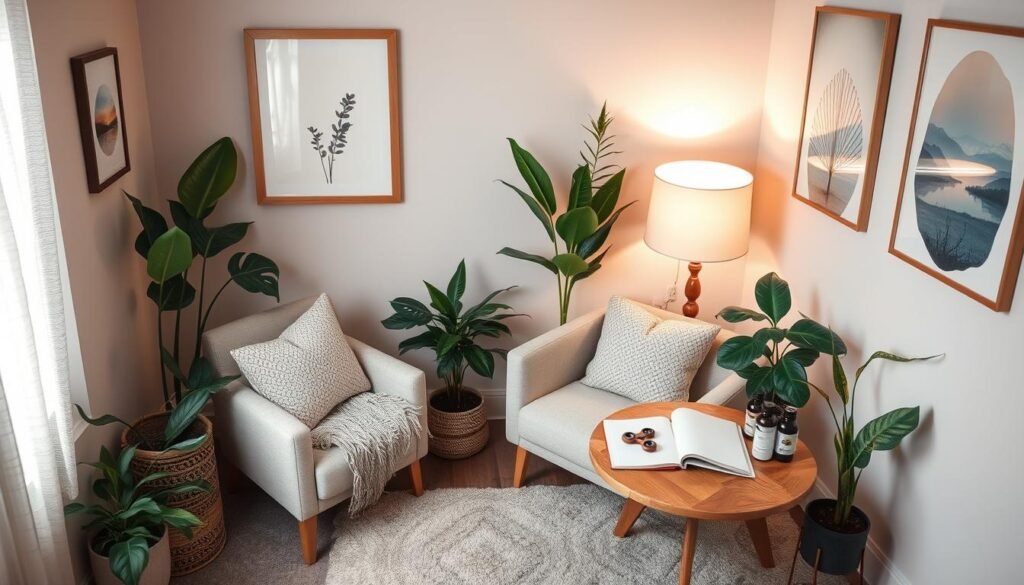About 18.1% of adults in the U.S. face anxiety disorders every year. This shows how common and deeply anxiety affects mental health. For those struggling, everyday tasks can feel overwhelming due to anxiety attacks. Knowing how these episodes work is key to getting help. By using certain strategies, people can relieve their symptoms and take back control of their lives.
Key Takeaways
- Understanding anxiety is vital for managing and coping with symptoms effectively.
- Effective strategies exist to help individuals regain control during anxiety attacks.
- Common triggers include work-related stress, family issues, and financial pressures.
- Regular exercise can cut anxiety symptoms by up to 50%.
- Accessing support from friends, family, and professionals is crucial in overcoming anxiety attacks.
Understanding Anxiety Attacks
Anxiety is a normal feeling. Yet, some people have anxiety attacks. It’s different from feeling worried or scared sometimes. Anxiety attacks grow slowly and can mess up your day. They’re not like panic attacks, which hit you all at once.
Knowing what causes your anxiety helps a lot. It also helps to know the signs. This way, you can deal with them better. If you know what to look for, you won’t be so scared of them.
What is an Anxiety Attack?
An anxiety attack means suddenly feeling very scared or nervous. You might feel your heart beat fast, sweat a lot, or feel dizzy. When this happens, you might not even realize it’s an anxiety attack.
Symptoms of Anxiety Attacks
The signs of anxiety attacks can be different for everyone. Some common ones are:
- Rapid heart rate
- Trembling or shaking
- Shortness of breath
- Feeling lightheaded or dizzy
- Nausea or stomach issues
- Chills or hot flashes
- Feeling really scared, like something awful might happen
Knowing these signs is important. It helps you handle panic better. And it shows when you might need to get help.
How Panic Attacks Differ from Anxiety Attacks
Panic attacks and anxiety attacks are not the same. Panic attacks come on very fast and are very intense. They can happen even when you’re feeling okay. And they don’t last long.
Anxiety attacks take longer to build up and can last for hours or days. The way they show up can change a lot.
Common Triggers of Anxiety Attacks
Knowing what causes anxiety attacks is key to handling them. When you figure out your triggers, you can learn how to deal with them. This helps lessen how bad anxiety attacks feel.
Looking into life stressors and things around you is a big step for mental health.
Identifying Personal Triggers
Common anxiety triggers like caffeine, negative thoughts, or tough situations cause anxiety for many. Drinking five cups of coffee might make people prone to panic feel more anxious. Knowing what specifically triggers your anxiety is important.
Triggers include:
- Negative self-talk
- Social situations or public speaking
- Stressful life changes
- Health concerns, including chronic conditions like asthma or diabetes
Becoming aware of these can help you manage anxiety better and face fewer panic attacks. Read more about it here.
Major Life Stressors
Big life changes or problems like job issues or money worries can lead to anxiety. Many feel their anxiety go up during big life shifts or conflicts. Health problems can make this worse.
Not eating regularly might make your blood sugar drop, making you irritable and anxious. Knowing these triggers is a big step in preventing anxiety attacks.
Environmental Factors
Environmental factors also play a big role in triggering anxiety. Crowds or loud noises can be very stressful for some. About 45% of people with anxiety disorders find changes in their surroundings make their anxiety worse.
| Trigger Type | Examples | Impact on Anxiety |
|---|---|---|
| Life Stressors | Employment, Health Issues | High |
| Nutritional Factors | Skipping Meals, Caffeine | Medium |
| Environmental Factors | Crowded Places, Noisy Environments | High |
Understanding common anxiety triggers helps people spot patterns and get ready for stressful times. It’s the first step to better mental health.
Effective Techniques for Anxiety Attack Help
When facing anxiety attacks, it helps to know some effective ways to deal with them. Learning different techniques lets people regain control over how they feel and react. We’re going to look at some useful methods like breathing exercises, grounding tips, and visualization. These strategies are key to coping with anxiety.
Breathing Exercises to Regain Control
Breathing exercises are vital in managing anxiety attacks. The 4-7-8 technique is one good method. It involves breathing in for 4 seconds, holding for 7, and exhaling for 8 seconds. This technique can cut anxiety levels significantly. Studies show that controlled breathing can reduce symptoms by almost half. Doing this regularly helps with relaxation and managing anxious moments.
Grounding Techniques for Immediate Relief
Grounding techniques offer quick relief during an anxiety attack. The 5-4-3-2-1 method is one such strategy. It helps you focus on your surroundings. You’ll look for:
- Five things you can see
- Four sounds you can hear
- Three objects you can touch
- Two smells you can identify
- One taste you can sense
This method helps shift your focus away from anxiety. It brings a feeling of calm and being in the moment.
Visualization Strategies
Visualization also helps with anxiety attacks. Imagine peaceful places or calming situations. Studies indicate that visualizing pleasant scenes reduces anxiety symptoms. It offers a mental break from stress and creates a positive outlook.
Practicing Mindfulness for Anxiety Management
Mindfulness is a key tool for handling anxiety. It’s about living in the moment and accepting feelings without critique. By practicing mindfulness, people can better understand their thoughts and emotions. This builds emotional strength, making it easier to deal with anxiety.
Understanding Mindfulness
Mindfulness helps us stay aware and accept our current state. Studies, such as those in the American Journal of Psychiatry and JAMA Internal Medicine, show its benefits. Techniques like meditation and deep breathing reduce stress and anxiety, improving mental health over time.
Simple Mindfulness Practices
Adding simple mindfulness exercises to your day helps a lot. Here are a few good ones:
- Guided Meditation: Online guided meditations offer a great start.
- Focused Breathing: Taking time to focus on breathing can calm and ground you.
- Mindful Walking: A mindful walk lets you enjoy the moment, decreasing anxiety.
These methods can become part of your daily routine. Programs like Mindfulness-Based Stress Reduction (MBSR) combine many techniques. They’ve been shown to effectively lower anxiety. People participating in these programs report significant satisfaction.

Bringing mindfulness into your life boosts emotional strength. It gives you tools to confront anxiety. Even brief moments of mindfulness can have profound effects. For deeper insights, visit this guide on meditation for anxiety.
| Practice | Benefit |
|---|---|
| Guided Meditation | Improves focus and reduces anxiety |
| Focused Breathing | Helps regain calmness in stressful situations |
| Mindful Walking | Enhances mood and lowers anxiety levels |
Creating a Supportive Environment
A supportive environment is key for those handling anxiety. Telling friends and family about one’s anxiety can help. It builds understanding and forms a network of anxiety support. Talking openly about feelings can lessen the loneliness and empower others to help.
Informing Friends and Family
Talking about anxiety with loved ones can make bonds stronger and support better. But, most people find sharing hard. Surveys show 80% have trouble talking about their anxiety. Teaching friends and family about its effects can create better interactions and relationships.
Finding Peaceful Spaces
Finding calm places is vital for stress relief when things get too much. Looking for quiet spots helps folks unwind and take care of themselves. It could be a comfy room, a quiet park, or a meditation area. Such places offer comfort and a safe feeling.
Utilizing Support Groups
Support groups, in person or online, are great for folks with anxiety. They bring together people with similar experiences, making everyone feel they belong. Studies find 74% think a support network is key for handling anxiety well. Being active in these groups can offer new coping tips and emotional support.
Anxiety Attack Resources and Support
It’s key to find good sources for managing anxiety attacks for recovery. Many people get a lot from seeking help for anxiety in different ways. This includes professional advice, online tools, and talking to others. Each method gives useful tips and ways to deal with anxiety.
Seeking Professional Help
Getting professional advice is very important for handling anxiety well. Experts like therapists provide ways to understand and deal with what causes anxiety. They suggest seeking help for anxiety early. This is because starting early often means you get better faster. So, talking to a mental health pro is a good step.
Online Resources and Apps
Nowadays, there are many online tools and apps to help with anxiety. They offer learning sessions and practical tools right where you are. Some apps have guided steps for breathing and being mindful. These steps are helpful for controlling anxiety attacks.
Peer Support Options
Talking with others who understand can be very comforting. Groups and online places let people share and express themselves. Talking with others helps feel you’re not alone and builds strength against anxiety. Having support for anxiety attacks and sharing stories can make a strong support network. This helps a lot with recovery.

| Resource Type | Description | Examples |
|---|---|---|
| Professional Counseling | Therapists provide personalized treatment plans. | Cognitive Behavioral Therapy, talk therapy |
| Online Tools | Access to educational material and self-help strategies. | Webinars, articles, anxiety management apps |
| Peer Support | Connect with others for shared experiences and advice. | Support groups, online forums, community meet-ups |
Medication and Treatment Options
Finding the best way to manage anxiety can be tough. People must choose between medication and natural methods. Knowing when to use medication is crucial for treating anxiety effectively.
When to Consider Medication
Sometimes, medication is thought about when anxiety doesn’t go away with other methods. Those with severe panic attacks should talk to a doctor. Some people need fast relief, while others do well with just therapy at first.
Types of Medications for Anxiety
Antidepressants like SSRIs are often the first choice. Drugs such as fluoxetine and sertraline usually don’t have serious side effects. For panic attacks, SNRIs like venlafaxine are good too.
However, benzodiazepines can help quickly but might lead to addiction. It’s important to know how long to use these medications.
Complementary Therapies
Therapies like herbal supplements and acupuncture are helpful too. Natural remedies, like chamomile or essential oils, can ease anxiety. Adding yoga or deep breathing can also improve your mental health.
It’s vital to research these therapies and talk to a doctor to make sure they’re safe.
Overcoming Anxiety Attacks Through Lifestyle Changes
Making changes in your lifestyle can really help with anxiety attacks. Adding exercise and good eating habits are key. These steps can make you feel more balanced and in control.
Regular Exercise for Stress Reduction
Working out is great for beating stress. Try to be active for 30 minutes on most days. It doesn’t matter if it’s a fast walk, a run, or yoga. Exercise makes you feel good by releasing endorphins. It fights anxiety symptoms. Plus, sticking to a workout schedule can make you feel accomplished.
Establishing Healthy Eating Habits
What you eat affects your anxiety levels. A diet with complex carbs, proteins, and omega-3s is key. Eating whole grains like oatmeal and quinoa helps keep your energy stable. It’s calmness in a meal. Drink plenty of water to stay hydrated. Cutting down on alcohol and caffeine also helps with anxiety. This promotes better mental health through nutrition.
Managing Sleep and Rest
Getting enough sleep is crucial for dealing with anxiety. Aim for eight hours every night. Having a calming routine before bed can also improve your sleep. Things like deep breathing and avoiding caffeine can make your sleep space more peaceful. A regular sleep schedule makes you more emotionally strong. It helps you face everyday challenges better.

Seeking Professional Help for Anxiety
Anxiety can be tough for a lot of people. Getting professional help is a key step in feeling better. There are different kinds of therapy that meet your specific needs. This help can lead to a better quality of life.
Types of Therapies Available
There are many therapies to fight anxiety. They all work in their unique ways. Some well-known ones are:
- Cognitive Behavioral Therapy (CBT): Focuses on identifying and changing negative thinking.
- Exposure Therapy: Allows people to face their fears in a safe way.
- Group Therapy: Offers comfort through sharing experiences with others who understand.
Studies show that 60-80% of people with anxiety find help through CBT. That’s why it’s crucial to find a therapist who suits you.
Cognitive Behavioral Therapy (CBT) Explained
CBT stands out for a reason. It helps you notice and change harmful thoughts. Usually, this involves:
- Finding the thoughts and beliefs that make you anxious.
- Questioning these negative thoughts to see if they’re true.
- Using new coping skills and behaviors to fight anxiety.
Sticking to your treatment plan can make a big difference. People often feel better after just a few CBT sessions. For more info on anxiety therapy, check out this resource.
Conclusion
Handling anxiety attacks involves a few key steps. First, figure out what triggers them. Then, learn coping strategies. Also, don’t hesitate to get help from professionals.
To manage symptoms and causes, try mindfulness, breathing exercises, and grounding. These techniques can improve your coping skills. They make it easier to deal with anxiety.
Changing your lifestyle is also good for mental health. Exercise regularly and eat healthy. Make sure to get enough sleep. These actions reduce anxiety’s effects.
Having support is helpful, too. Family, friends, and groups offer encouragement. They are there to help you through tough times.
With these strategies, you can take control of your anxiety. Start managing your anxiety today for a better life. You can overcome anxiety with effort and support. It’s possible for many to beat it.